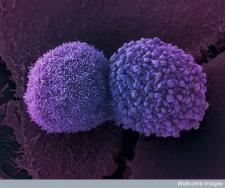Experimental Cancer Therapy Holds Great Promise — But at Great Cost
By Meghana Keshavan,
STAT
| 08. 23. 2016
Soon after she received the treatment, Karen Koehler’s brain swelled. Her blood pressure plummeted. As she fell into a coma, her husband and sister sat at her bedside — urging the doctors to keep pushing her farther along the razor’s edge between life and death.
Koehler was undergoing a promising — and terrifying — experimental therapy that her oncologists hoped could rid her body of cancer entirely. It’s called CAR-T therapy, and it works by engineering the patient’s own immune cells to attack cancer.
One of the hallmarks of CAR-T: It has to nearly kill you if it’s going to save you.
The treatment induces such sudden and severe side effects that it can take a small army of top specialists to keep patients alive while their newly engineered immune systems attack their cancer cells. The result: CAR-T remains so risky, so complex, and so difficult to manage that experts warn it’ll be years before it’s available to most patients who would stand to benefit — even though two drug makers, startup Kite Pharma and pharmaceutical giant Novartis...
Related Articles
By Pam Belluck and Carl Zimmer, The New York Times | 11.19.2025
Gene-editing therapies offer great hope for treating rare diseases, but they face big hurdles: the tremendous time and resources involved in devising a treatment that might only apply to a small number of patients.
A study published on Wednesday...
By Emily Glazer, Katherine Long, Amy Dockser Marcus, The Wall Street Journal | 11.08.2025
For months, a small company in San Francisco has been pursuing a secretive project: the birth of a genetically engineered baby.
Backed by OpenAI chief executive Sam Altman and his husband, along with Coinbase co-founder and CEO Brian Armstrong, the startup—called...
By Jessica Hamzelou, MIT Technology Review | 11.07.2025
This week, we heard that Tom Brady had his dog cloned. The former quarterback revealed that his Junie is actually a clone of Lua, a pit bull mix that died in 2023.
Brady’s announcement follows those of celebrities like Paris...
By Emily Mullin, Wired | 10.30.2025
In 2018, Chinese scientist He Jiankui shocked the world when he revealed that he had created the first gene-edited babies. Using Crispr, he tweaked the genes of three human embryos in an attempt to make them immune to HIV and...




